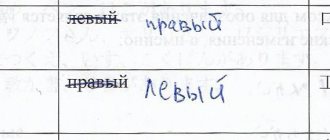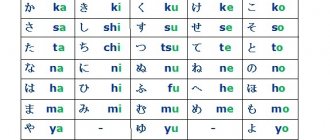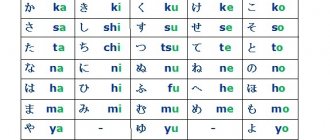Writing
Hiragana and katakana
Your first step in learning Japanese should be to learn hiragana and katakana, the two syllabaries of the Japanese language. Yes, there are three alphabets in Japanese. Hiragana and katakana consist of 71 characters each. In fact, the task is not much more difficult than teaching the Russian or English alphabet. We have a separate article about learning hiragana and katakana and Kanjiway can teach you hiragana and katakana in a couple of weeks, so let's move on.
Kanji
After studying hiragana and katakana, you come across a new problem: 2136 joyo kanji, aka hieroglyphs. Even if you learn 50 kanji a day, the process will take at least 42 days. The traditional teaching system asks us to write kanji on a piece of paper 20 times in a row and remember it. Many people do this for several days in a row and quit Japanese in a rage. In any case, a long process awaits you, so you need to ask yourself not the question “How can I quickly learn all these damn kanji?”, but “How to make the learning process as interesting and enjoyable as possible?” Fortunately, much more advanced methods for memorizing kanji have long existed, which we have already described in this article and laid the foundation for Kanjiway .
Sooner or later, you will still need to memorize all 2136 kanji. Another question often arises here: “Should I start learning Japanese with kanji or return to it later?” The answer is - start right away! The longer you put off learning kanji, the more difficult it will be to learn the rest of the Japanese language, but if you know kanji, you will begin to learn many times faster. This is absolutely logical, because without kanji you won’t even be able to read. First, learn at least 500 kanji, and then start combining learning new parts of the language and the remaining kanji. In the beginning, you only need to learn the meanings (translations) of kanji, not their pronunciation. We will discuss why this is so further in this article.
Words
First, let's remember Pareto's Law - 20% of the work is responsible for 80% of the result. In the case of languages, we can say that 20% of words are responsible for 80% of the language we use every day (or even more).
People often forget this simple truth when learning languages and think that they need to learn tens of thousands of words. Everything is much simpler! Let's take English as an example (because there is more linguistic research on it than on Japanese). In order to understand 80-90% of English writing you need to know only 2000 words! The situation is exactly the same with other languages, including Japanese. Even in the case of Kanji, there is no need to learn all 2136 characters at once, but you can start with 500 and already understand the language a little.
That is, if you know about 500 kanji and 1000 words, you will already have a very good understanding of Japanese. With knowledge of 200-500 words, you will already understand more than 50% of Japanese writing.
At the same time, do not forget that to understand the remaining 10-20% of the language you will need to learn several times more words. For JLPT level 1 (the highest) you need to know about 10,000 words, but don’t worry about the quantity, after learning the basics of the language, everything else will be much easier for you.
i+1
After learning the writing system, start learning words and sentences in Japanese. This is very simple to do - start reading and listening to Japanese and look for “i + 1” sentences for yourself. That is, those sentences in which you understand almost everything except “+ 1”. If you know 4 words out of 5-6, this is your next candidate for memorization and repetition. You need to do this until the moment you decide that you can stop. In fact, even when you achieve mastery of the Japanese language, you will still sometimes come across strange words, rare catchphrases and memes that you have not yet memorized. So you can repeat the bulk of words and sentences for a long time, and then stop doing it every day, but occasionally add new information.
Instructions for learning Japanese
To acquire language competence, you need to provide yourself with high-quality teaching aids, study regularly and follow the correct algorithm.
Learning the alphabet
Japanese uses 4 writing systems:
- Hiragana is for Japanese words.
- Katakana – for foreign words.
- Kanji are figured characters that came from China. There are about 2000 hieroglyphs in everyday use.
- Latin alphabet - for writing acronyms, company names.
Graphic form of the Japanese syllabary katakana.
Practice pronunciation
Work on pronunciation begins with reading katakana and hiragana characters. The meaning of a word depends on the pronunciation. The same word with a long and short vowel has different meanings.
Learn to write
You can start learning to write by installing the appropriate keyboard on your computer and mobile devices. It is convenient to use extensions that convert Japanese words written in Latin into hiragana and kanji.
Studying grammar
Knowledge of grammar will help not only understand the language, but also compose sentences on your own. In Japanese, the subject is optional; the predicate is always at the end of the sentence. Personal pronouns are used depending on the degree of formality of the situation.
Select dictionaries
Dictionaries will be required throughout the course. If you know English, it is better to use the Japanese-English version.
Watching movies and reading books
Along with studying grammatical structures from textbooks, it is useful to watch Japanese films. A phrase in a manual may seem foreign and incomprehensible, but when watching a movie, the phrase becomes recognizable in speech, after which it is easier to use it unconsciously. Watching movies helps improve your vocabulary.
When you have some confidence in Japanese, you can read manga and comics. It is recommended to choose texts without furigana (phonetic clues).
Lexicon expansion
To replenish your vocabulary, you can use the flashcard method, as well as install mobile applications. It’s good to have a notebook and write down unfamiliar words that you come across while reading books or watching movies.
Communication with native speakers
Communication with native speakers will help you use intonation correctly. A Japanese interlocutor can correct mistakes in a conversation.
Immersion
Input > Output
If you understand well what we are describing in this paragraph, then learning any language will no longer be an insurmountable obstacle for you. This is a very simple idea and it lies in the following: consuming information in a foreign language is much more important than using this language. That is, listening and reading are much more important than speaking and writing. This is especially important to understand in the initial stages of training. Let's figure out why this is so.
Imagine how children learn their native language, for example, Russian. Do they read textbooks on the Russian language and study its grammatical structure? Do they take classes and fill in the gaps in sentences with words? Do they take turns repeating new words and sentences in front of the mirror? In no case. They live in an atmosphere of the Russian language, everyone around them speaks Russian, they read simple books in Russian and after a few years they already master it many times better than a foreigner who has been taking Russian language courses for the same amount of time. How does this happen? It’s very simple - our brain is already tuned to learning languages . If you watch a movie in a foreign language, you may not understand anything at the moment, but your brain spends its energy trying to decipher the new language. If you watch 10 more films (or better yet, watch the same film 10 times), then you will understand the language better. Much better than if you spent the same time cramming the grammatical structure of the language. Therefore, your main task when learning Japanese is this: surround yourself with Japanese as much as possible and cram into yourself as much information in Japanese as possible. Not textbooks and courses, where everything has already been chewed for you, but precisely the information that the Japanese themselves use.
Listen and read, even if you don't understand
Start devouring the Japanese language. Start watching anime with Japanese subtitles, start listening to Japanese podcasts, start reading manga in Japanese, find Japanese music that interests you and listen to it. This is how you will begin to truly learn the language. We are stopped by the discomfort that appears if we do not understand something. You need to get used to this discomfort while learning a new language, otherwise you will not achieve success and any meaningful progress. Listen to exactly what you like in life and is not related to Japanese. If you like football, watch videos about football in Japanese. If you are a programmer, listen to a podcast about programming. Yes, at first you will not understand anything, but over time you will begin to understand. Thus, in a few months, instead of searching for information on the RuNet, you will be able to Google in Japanese and find something interesting for yourself. With each new listen, you get closer to a good command of the Japanese language. If you watched some anime in Russian, then watch it again, but only in Japanese. You already know what the plot is and roughly remember what the characters are talking about?
In addition to actively immersing yourself in Japanese, you can also play something in the background. For example, if you are sitting in a quiet room, you can turn on something in Japanese and continue doing your thing.
In the first couple of months of this pastime, you do not need to scrupulously look up the translation of each new word with a dictionary. Just soak up the Japanese and you'll figure out everything else later. If you constantly listen to native speakers, then you simply technically will not be able to speak it incorrectly, because you are listening to the native Japanese in your environment.
By the way, an important note specifically for the Japanese language. In Japan, men and women speak differently. Something like Russian masculine and feminine genders for words, only more complicated. So it’s better to listen to the speech of a person of your gender, otherwise you risk ending up in the position of a man who describes himself in feminine terms or vice versa.
Create a Japanese atmosphere
Our environment influences us as much as our inner thoughts. If you get home after work and are faced with the choice of spending 30 minutes on Kanjiway or watching YouTube for 30 minutes, what would we base our decision on? Not just on your desires and “willpower”, but also on what surrounds you at the moment. What will we choose if in your room somewhere in the corner there is one Japanese tutorial that you have already stopped noticing, and the YouTube tab is so conveniently a couple of clicks away? Or conversely, what would you choose if there are many factors in your room that remind you of your goal to learn Japanese?
Here are some examples of how you can make your atmosphere as Japanese as possible:
- Buy some paper books in Japanese
- Hang Japanese posters on the walls. Including a poster with 2136 joyo kanji
- Switch your phone and computer to Japanese
- Write down all the learned kanji on a piece of paper (30-50 pieces per sheet) and hang them on the walls
- Write down grocery lists and any small notes using Japanese
- Manga wall
- (for the especially hardcore) Establish a VPN connection with Japan so that all sites and contextual advertisements are displayed in Japanese
Is it necessary to do all this? Well, of course not. It's much more important to actively absorb information through books, movies and podcasts, but this approach will greatly help you stay on track and not deviate too much from it. Surely you already have those books in Japanese that you would like to read, but don’t understand them at all yet. Put them in a prominent place and they will remind you of why you are learning Japanese.
Let's go back to the YouTube example. Now, if you walk into a room after work that has Japanese posters, Japanese books, and a computer running in Japanese, how much more likely are you to avoid wasting 30 minutes on fleeting pleasures?
If you well understood what we described in this article, then you probably noticed a live hack: you can watch Japanese YouTube
Do at least a little, but every day
Set yourself a minimum bar and make sure you meet it every day. We emphasize that this should be the minimum bar, do not overestimate it. Let it be five kanji. Or three. Or even one. At Kanjiway we have a streak system that makes sure you meet our minimum benchmark every day. This is about 10 reps, that is, repetitions of the information covered. Of course, on average you should learn more than the minimum level. The point of the minimum bar is that you achieve it every day . If at some point in your life you have a lot of things to do and you cannot devote 30-120 minutes a day to the Japanese language, but you do a streak, then in a few months you will understand how great you are for continuing to learn at least a little bit. The same as if you saved N rubles a day for the last few years. Everyone has bad days in life and the most important thing in them is to slow down a little, but under no circumstances stop.
Are textbooks needed?
The short answer is yes. The real answer is no. The long answer is - not really.
Textbooks will help you learn Japanese, but don't start with them (as we said, start with kana and kanji). The approach to learning a language with the help of textbooks is more correctly described not as learning a language for its use, but as learning a language for its linguistic study. It's more like learning to drive a car, which starts with learning about the internal combustion engine and thermodynamics. Did you need a textbook when you were learning Russian? You don’t need a textbook for Japanese either, but it will help if you use it correctly.
Our advice is to learn 1000 kanji, 500 words and 200 sentences, and then connect any textbook to your taste in order to better understand what exactly you have learned and what you should learn next.
The secret of the approach that we describe in this article is that you will learn most of the grammar automatically , simply through constant contact with the language. Moreover, in reality, not all phrases that we use in everyday life obey grammatical rules or simply common sense. For example, complete the sequence: one year, two years, three years, four years, five...? Five years? Five years? Another example: Spaniards live in Spain, Italians live in Italy, Japanese live in Japan, and Turkey live...? Turkish?
When you start learning a language by studying the laws of the language, you often figure out how you can cram the learned vocabulary into the studied grammatical structures, after which you proudly come to Japan and declare that “I am Turkish from Turkey, I have been studying Japanese for the last five years.” Therefore, use textbooks as an aid to learning Japanese, not as a basis. Your foundation is your hours of watching anime with Japanese subtitles and reading Japanese books.
When to learn to speak?
You don't have to learn the pronunciation of all the words from the very beginning. Don't concentrate on this, devote your energy to learning kanji. If you listen to Japanese a lot, over time you will automatically remember how to pronounce a sentence correctly, just like with grammar. Come back to this question 2-4 months after you start learning and decide for yourself how important pronunciation is to you right now, but in the initial stages of learning, understanding the language is much more important than using it.
Likewise, you don't need to learn the pronunciation of kanji from the very beginning (and they often have more than one pronunciation) - leave it for later and over time you will see that there is no need to devote as much time to them as you usually devote to them.
Mistakes when learning Japanese
The following mistakes are made when learning Japanese:
- Neglecting regular exercise. To achieve results, you cannot exercise from time to time.
- Japanese is not Russian. Most Russian phrases simply translated into Japanese will not make sense. To use Japanese words correctly, you need to learn them in context.
- Vowel lengthening. Beginners do not always pay attention to the longitude of vowels, and later they have problems remembering the longitude.
- Lack of system. Understanding will be brought by constant repetition of the material covered, and not by the desire to quickly go through the textbook.
- Excessive imagination. You can’t overthink anything, because you may not only not understand the meaning of what is written, but also learn the material incorrectly.
- Reading to yourself. It is recommended to read aloud, pronouncing each word clearly. You need to read it out loud. You can record on your phone and listen to it.
- Using Cyrillic transcription.
- Signing the pronunciation of words in the text. This bad habit prevents you from memorizing new words, because the hint does not give you the opportunity to think. It is better to write down new words in a notebook.
- Ignoring speech style. The language uses different pronouns when referring to a man and a woman, to an older person and a younger person. Correct speech formation will help you avoid stupid situations in the future.
How long does it take to learn Japanese?
What is your goal?
Do you want to watch anime in the original? Do you want to work with Japanese companies? Do you want to live in Japan or become a translator? We can say that after a few months of learning Japanese for 1-2 hours a day, you will already be able to watch anime with Japanese subtitles and have a good understanding of what is being said. We can't give you an exact figure because it depends directly on your desire to learn Japanese and the whole equation depends on this variable. You will hear different numbers everywhere because people teach differently and therefore get different results. If a person taught Japanese for 10 years and decided that Japanese can be learned in only 5 years, then, as a rule, he will not constantly look for new learning methods and try to reduce this period. Rather, on the contrary, a person will resist all innovations, defending his original statement. So take your learning into your own hands and don't listen to anyone (not even us). Always look for the most effective ways to study and work at your own pace . With the advent of the Internet, this has become easier than ever.
The best thing you can do is start now and come back to this issue in a couple of months, when you already understand the structure of the Japanese language, the amount of work ahead and how long it will take you to reach your goal.
Set the right goal and have fun
How long does it take to learn Japanese? The answer is long. We can even say so - for a long time . But whether it will be difficult depends only on your attitude towards learning. If you mutter to yourself that learning Japanese is hard work that not everyone can do, then your prophecy will come true and learning Japanese will become hard work for you. If you enjoy the process of learning Japanese, then what does it matter to you how long you study? In this case, on the contrary, the longer the better.
Let's say you start learning on Kanjiway today and in a month you will learn 500-1000 kanji. When watching an anime with subtitles, you will understand, for example, 15% of what is happening. At this time, your brain will try to sort out all the incomprehensible information and in a couple of days you will understand 16%, and after another couple of days - 17%. Step by step and day by day you will get closer to the mark that is your goal. But the secret to successful learning is that you must stop focusing so much on the end point of the journey.
Your correct goal should not be “Learn Japanese”, but “Increase your Japanese skill by 1%”.
Learning Japanese should be an enjoyable experience that you'll want to do when you get home from work. Learn Japanese not with textbooks, but with what you enjoy - be it anime, e-sports, painting or music. If you set yourself the goal of “learning Japanese” and constantly follow it, then every day you will ask yourself: “Did I learn Japanese today? Do I already understand Japanese football commentators?”, to which you will receive a negative answer for a long time and will finish studying much earlier than you achieve your goal. The paradox is that if you are very serious about learning the Japanese language, then first of all you need to stop taking it “seriously” and start taking it more measuredly, understanding the simple features of human psychology. When you start learning Japanese, it will become a part of your life and you need to manage to position it in your life so that it does not become a “thing to do”, a “responsibility to yourself” or a “tool that is not yet profitable” "
If you learn to follow the Japanese path step by step and set yourself the goal of “Increasing your Japanese skill by 1%,” then you will get the result not in a few months or years, but in a week or two. In addition, you will feel and understand that you are constantly moving forward and will accomplish not just one goal, but 70-100 goals along the way. Each of us has in our heads “Ordinary human brain, 1 piece.” If you constantly think about how to “learn Japanese”, then your brain will look at what is behind this thought and see 2500-3500 kanji, thousands of words and sentences and months of work. After which he will logically tell you “SO STOP STOP STOP, LET’S NOT GO THERE, LET’S BETTER WATCH YOUTUBE.” If you start constantly thinking about how to “increase your Japanese level by 1%,” then your brain will look at this thought and see 100-200 kanji there and say “Well, in principle, it’s not bad, you can try.”
Maybe even now you are thinking that “Japanese is very difficult, I’m unlikely to be able to learn it. And in general it takes a long time and is not particularly necessary.” In this case, stop thinking about how to learn Japanese and ask yourself “If Japanese is so difficult to learn, then maybe I’ll only learn 1% for now, and then we’ll see?” When you learn 1%, then stop and ask yourself, “Japanese is still very difficult, but maybe I can learn at least 2%, and then we’ll see?” If you want, instead of "1%" say "100 kanji" or "200 words". Surely you can learn 7 hieroglyphs a day and learn 100 hieroglyphs in 14 days?
You must understand that when you reach your ultimate goal and “learn Japanese”, then it will cease to be a special thing for you and will become an ordinary thing. Remember, for example, how much you enjoyed driving the first year after getting your license and how you feel about it now, or how happy you were when you bought your phone and what place it has in your life now. Or think about how often you remember that you know Russian and how cool that is and how you felt about it as a child when you first learned to read. Those parts of the Japanese language that now seem difficult or routine to you, such as learning kanji or not understanding new words - in a couple of years you will look back on them with fondness, realizing that the golden time was then (that is, now). Unfortunately, you can't just decide and start enjoying the process right away, but you can learn. So start learning now. Your brain and mood will thank you for it.
In the words of a classic: “We should be happy, we shouldn’t stress.”
Well, how long does it take to learn Japanese?
We hope that after reading this article, you begin to understand that “How long does it take to learn Japanese?” - this is the wrong question . If you ask yourself this question and look for an answer to it, then you will never learn Japanese . Your brain will decide for you that it is better not to waste time on such a long goal. Therefore, you must ask yourself the right question and ask yourself, “How long will it take me to achieve my goal?” What is your goal? Correct - 1%.
But you probably came for a specific number, so here is an approximate time frame for how long you will learn Japanese on Kanjiway :
- In the first month you learn hiragana, katakana and 100-300 kanji. You will be able to read hiragana and katakana, but you will not always understand what the word or sentence itself means. You will also be able to read simple sentences with learned kanji in Japanese and have a good understanding of what is being said.
- Over the next 2-3 months you continue to learn kanji and already know 1000-1500. You already understand enough to read average Japanese texts and watch Japanese anime/series with subtitles and understand about 40-60% of what is happening. You periodically look at the dictionary when you don’t understand something.
- Over the next 2-5 months, you increase the number of kanji to 2500. Now you understand Japanese text well and can watch anime/series with subtitles without any problems and not have to look at the dictionary every 10 minutes.
- You've learned all the kanji you need, but you still need to review them occasionally. You log into Kanjiway for another 1-3 months a couple of times a week and repeat the rarest kanji that you may sometimes forget.
We would like to clarify that by “learned kanji” we mean not just “read it once and remember it,” but “memorize it once and repeat it 4-10 times.” That is, maybe you still read kanji not as quickly as the Russian language, but you don’t need to look for their translation, you already remember it well.
In total, we ended up with about 6-12 months on Kanjiway. As you can see, the main training occurs in the first 2-4 months. We're giving average numbers here, but in reality you can go much faster if you want. Since Kanjiway is not a “Japanese course” in the classical sense, you don’t have a group of students with whom you need to stay on the same level and not run too far ahead. We do not put any restrictions on you and you can learn at the speed that is convenient for you.
Why is it impossible or difficult to learn Japanese?
Motivation is a fire that should constantly burn, and the goal is to get somewhere, etc. and any other external motivation is more of a wick that will burn out sooner or later, because... You only feed yourself with the future.
Yes, having a goal is not bad , and even good, but this is not the key point . And in order to heat the internal stove, you need to get a lot of firewood from outside now. A little later we will talk about what kind of firewood I am talking about and how to get it.
This can be represented in the form of a pyramid, where the basis, the foundation of everything is your INTERNAL motivation , i.e. Your desire to do something constantly. After all, you cannot build anything great on the foundation of a barn.
No external motivational influences will affect a person if he does not have his own internal motivation, this core.
The larger and stronger the foundation, the better the next step will stand.
Next comes the 2nd stage of our pyramid - this is the competent selection of educational material and the choice of courses/tutors, etc. Since not everyone can (or can, but does not want) to afford a tutor, regarding the second stage we also had an article about the necessary educational materials for learning Japanese, where we completely closed this question of how to study on your own. Usually all construction ends here.
The third stage of our structure is various techniques about which there were also a lot of different articles, for example, about how to learn more than 100 kanji in one sitting or how to quickly learn foreign words. And there will be many similar ones in the future. These videos cover the issue of the 3rd stage of our construction.
It often happens that instead of a good foundation, they lay some kind of foundation and put a second step on it, thinking that such a foundation will do, but this is not so, sooner or later everything will collapse. And even if by some miracle everything remains shaky, look at how tall your building will be. Do you like it? Does it look tough?
One more thing
What about JLPT?
We recommend treating JLPT in the same way as textbooks. Periodically review what you need to know to pass the JLPT, but don't base your Japanese learning on it. Even JLPT Level 1 (the highest) is not an indicator of mastery of the Japanese language. Yes, of course, this confirms that you are very well versed in Japanese and this is a very great achievement, but it does not guarantee that you know Japanese even close to how the Japanese themselves speak it.
JLPT is aimed at foreigners, so the Japanese treat it as such. In essence, JLPT is like the Unified State Exam in Japanese. You won’t claim that you know physics well if you passed the Unified State Exam in physics? Yes, this exam confirms something, but it does not tell you that you can already go design bridges and rockets.
If you know English, we recommend watching this video to understand why the JLPT should not be considered the main measure of your knowledge of Japanese.
Features of Japanese culture
Each culture has its own characteristics. For Russians, they begin with a special path, spiritual unity and bonds, and end with stereotypes about vodka and bears. One of the prominent features of Japanese culture that is important for us to learn Japanese is that the Japanese consider themselves to be a “special kind of people.” Of course, it’s not official, but this understanding exists at a cultural level and the average Japanese understands this as well as the average Russian is accustomed to the corruption of officials and leaky roads. They live on their own island, they have a mono-ethnic state with one of the strongest economies in the world. Most people there have absolutely no need to have any contact with other nations on the planet. They also treat the Japanese language as a “special” language and do not take seriously stories that a non-native Japanese can learn Japanese as well as a Japanese himself. They don't expect foreigners to speak Japanese well, and even if you barely string two words together, a polite Japanese person will still tell you that %USERNAME%-san's Japanese is excellent. Therefore, you should often not count on the Japanese to help you improve your Japanese in any way. Even if you ask them to correct you every time you make a mistake in your speech, they still probably won't do it because of their notions of politeness. Take your learning into your own hands , don't listen to anyone who tells you that Japanese is super hard and impossible to learn. Don't listen to those who say that Japanese can be learned in two months, nor those who say that Japanese can be learned in at least five years. Start understanding the Japanese language yourself and over time you will find answers to all the questions that are important to you.
Dream
The most important thing is Sleep! You probably know that new neural connections are created during sleep.
At the same time, the restructuring of connections between neurons does not occur at any time. Since this process is not very fast, in order to rebuild connections between neurons, we need regular sleep. And this is one of the main functions of sleep.
Everyone has their own optimal time for sleep, but there is one recommendation for everyone, which says that you need to sleep at least 6, but no more than 9 hours.
All these recommendations will actually not fundamentally affect your study; they will improve, but will not radically change the situation. What is really important is the motivation and the tools that I have given before and will continue to give. Try to honestly answer the question: “Do I really want to learn Japanese?”
Programs to study
Convenient programs that can be installed on your laptop and smartphone will simplify language learning.
Wakan
This application can:
YARKSI
The Japanese-Russian computer dictionary contains 60,000 words, a database of hieroglyphs with Russian names and interpretations, and supports searching by multiple characteristics and by graphic image.
The program for storing flash cards is a recognized leader in its field. It has versions for all operating systems and mobile phones, including the Internet version. All you need to do is install the program on any convenient device, and then just learn.
ZKanji
The program is a competitor to “Wakana”. They differ in that they do not contain a translator.
WWWJDIC
The program allows you to search for combinations of words in the browser and translation from the address bar.
AppLocale
If the application does not show Japanese characters, but scribbles, then you need to launch it from AppLocale. The utility allows you to run applications in a different system locale.
AGTH/Chiitrans/Chiitrans Lite
The application allows you to play novels, finding out the meanings of unfamiliar words and translating sentences.
Rikaichan
Browser module with pop-up translation of Japanese words into other languages. Has a dictionary of names.
How much money do I need?
Before you answer this question, you need to decide how you will learn Japanese. You have three options: on your own, with a tutor, or in courses and at a language school in Japan.
Classes without a teacher at home will be the cheapest. You don’t have to pay money for them, you don’t have to buy textbooks either - their electronic versions are easily available on the Internet. You can watch educational videos for free and read materials shared online by other people learning Japanese. It turns out to be a conditional zero if you do not include the cost of office supplies.
Lessons with a tutor or courses will be more expensive. In Moscow, tutors ask on average one thousand to one and a half thousand rubles for an hour of lessons. Naturally, the courses will cost a little less - somewhere around a thousand per lesson. In smaller cities - less. It would be good to study about two times a week for an hour and a half. Let's do the math: in a month, Japanese classes will cost 13.2-18 thousand rubles with a tutor and about 9-10 thousand on courses ; you may have to invest money in textbooks if the teacher demands it.
The next option is a language school . Speaking frankly, this is an expensive business - a month of studying and living in Japan will cost about 100 thousand rubles .
To summarize at this point, we can say that learning the Japanese language can be either conditionally free or require quite a lot of money. It all depends on your personal choice and the amount you are willing to spend on this matter. The only thing we would like to advise you is: don’t jump out of the frying pan and into the fire right away and don’t run to register for training at a language school. Try the first two options first. Perhaps they will suit you perfectly, and you will save your money for an independent trip to Japan, for example.










